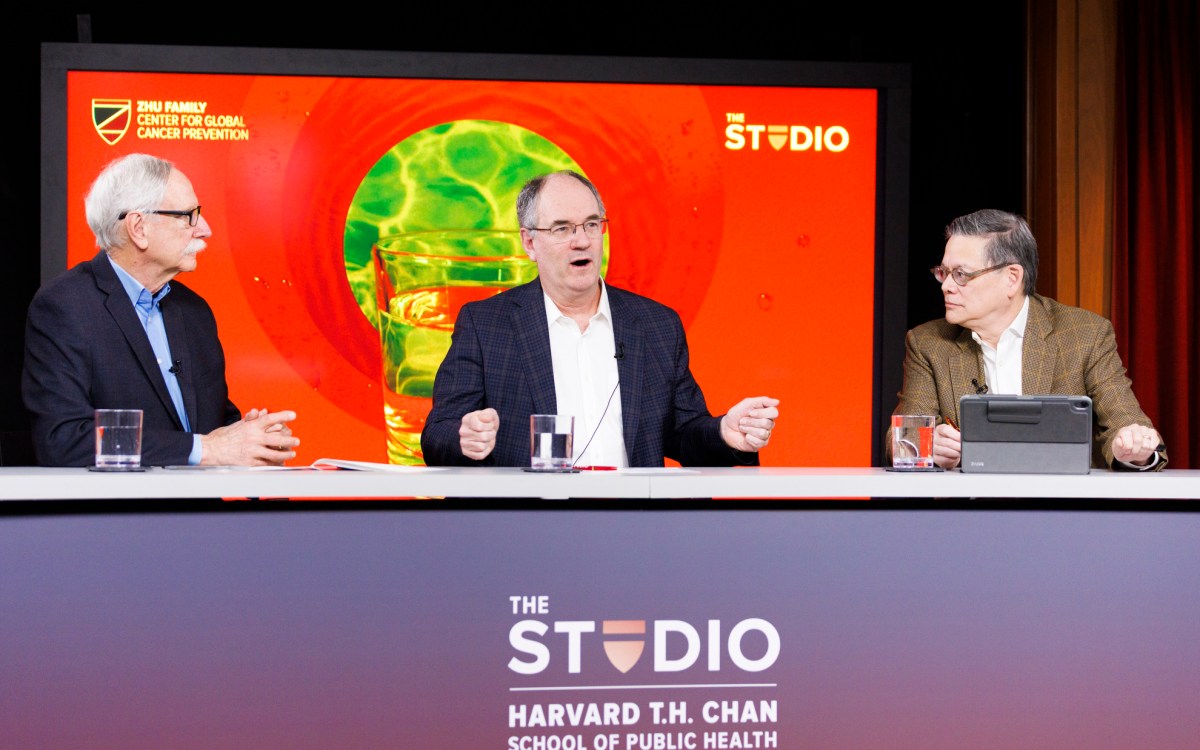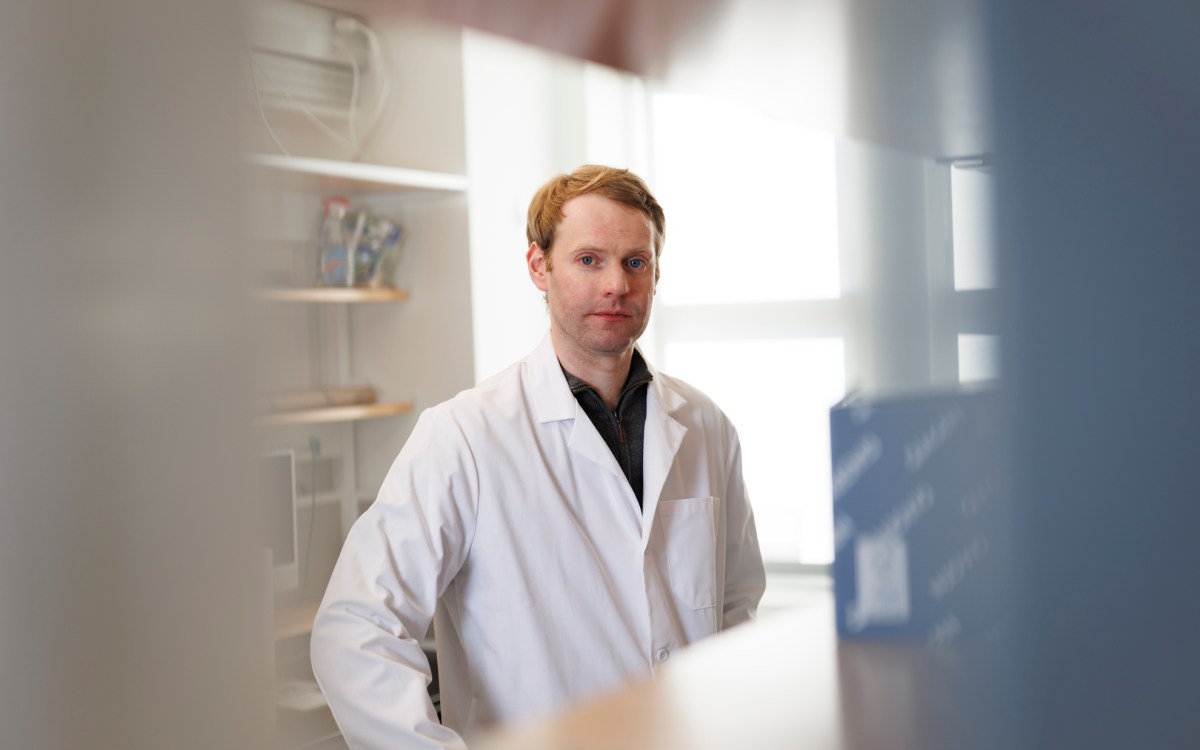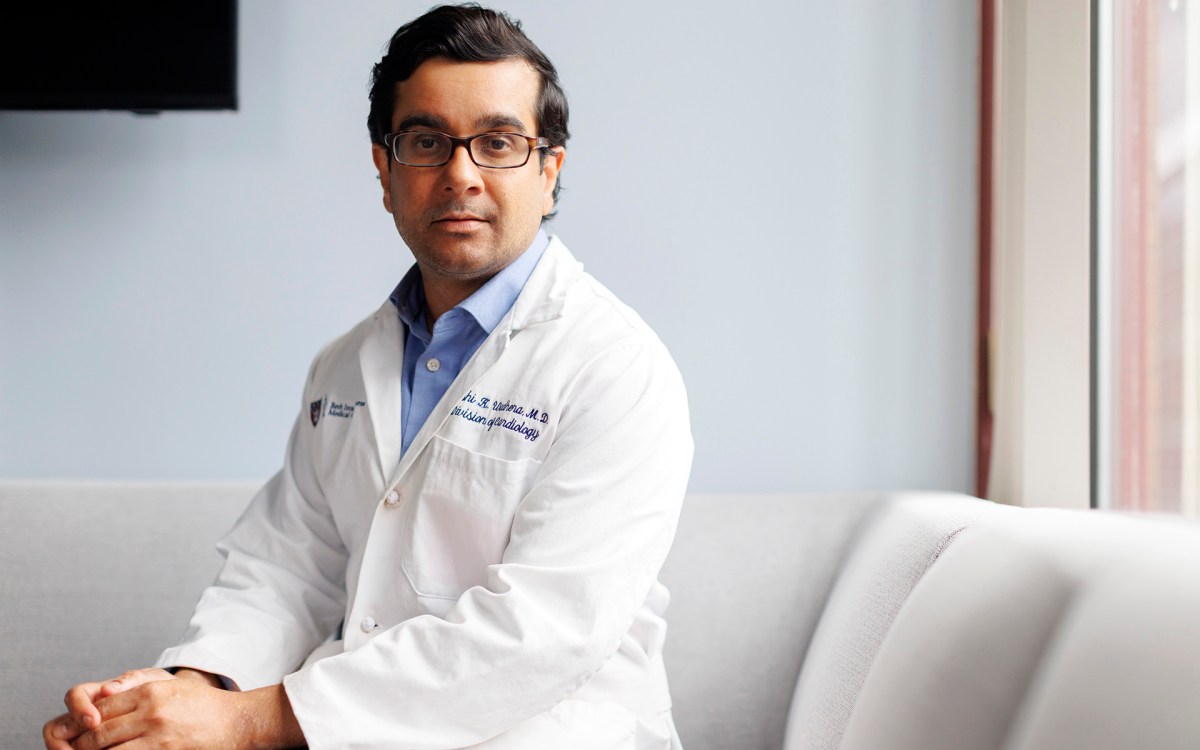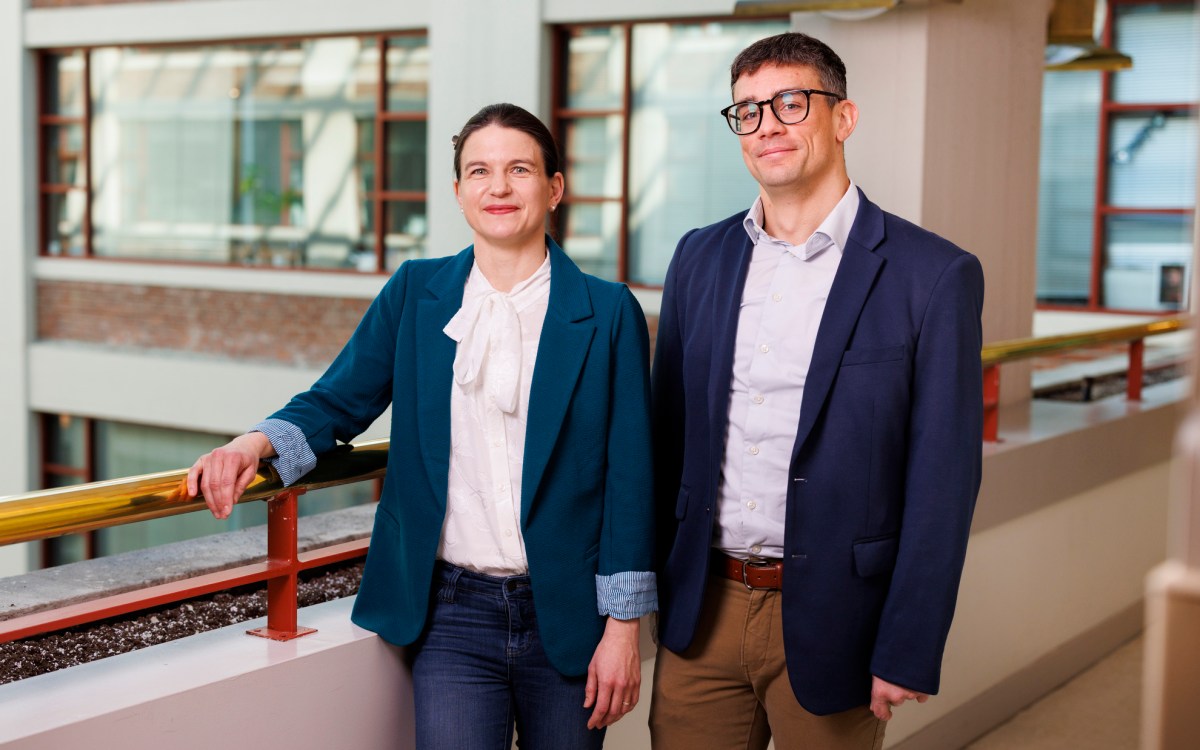Health
-

Which is worse, a soda or a beer?
Experts seek to clarify the health effects of alcohol and sugary drinks
-

‘I think I know how to fix this.’
How a discovery in a Harvard lab is offering hope for patients with hard-to-treat heart disease

-

American heart health worsening
New statistical snapshot finds disappointing trend despite advances in treatment, ways to prevent nation’s leading cause of death

-

Tracking mysteries of loss of Y chromosome, cancer
Research suggests it may explain higher incidence, severity of some disease in men
-

How realistic is ‘The Pitt’?
Doctors weigh in on what hit TV show gets right and wrong about life in the ER — from pacing and caseloads to workplace culture (and that waiting room from hell)
-

Yoga can help cut severe, initial opioid-withdrawal period in half, study finds
Researchers say results could dramatically increase chances of recovery
-
Practical way to target cancer cell mutations demonstrated
A study led by researchers at Dana-Farber Cancer Institute and Broad Institute of the Massachusetts Institute of Technology and Harvard University provides the first demonstration of a practical method of screening tumors for cancer-related gene abnormalities that might be treated with “targeted” drugs.
-
Study: Heed spiritual needs of cancer patients
People with advanced cancer felt they received little or no spiritual support from religious communities and the medical system, according to a new survey. However, those who did receive such support reported a better quality of life.
-
Study shows importance of sleep for optimal memory functioning
Harvard researchers have tracked fatigue’s footsteps on the human brain, showing that sleeplessness impairs the ability to learn new information and that abnormal brain function, not reduced alertness, is the cause.
-
Sleeping your way to heart health
A new Harvard School of Public Health study indicates that there’s more than just olive oil and red wine keeping heart disease rates down in Mediterranean countries. There’s the naps, too.
-
Web quiz helps predict women’s health
Using data collected from more than 24,000 initially healthy American women, researchers from Brigham and Women’s Hospital (BWH) have devised a new Web-based formula called the Reynolds Risk Score that for the first time more accurately predicts risk of heart attack or stroke among women. In addition to usual risk factors like cholesterol, blood pressure, and smoking, the new Reynolds Risk Score adds information on two new factors: family history of heart attack prior to age 60 and blood level of C-reactive protein (CRP), a measure of artery inflammation. Using the new risk assessment tool, the researchers found that nearly 50 percent of women in the study who were estimated to be at “intermediate risk” for heart attack or stroke based on current guidelines were in fact at significantly higher or lower risk levels.
-
Genome-wide map will help fight diabetes
The Broad Institute of MIT and Harvard, Lund University, and Novartis have announced the completion of a genome-wide map of genetic differences in humans and their relationship to type 2 diabetes and other metabolic disorders. The announcement was made Monday (Feb. 12). All results of the analysis are being made accessible, free of charge, on the Internet to scientists around the world.
-
New findings may increase longevity of stem cells
Identifying the mechanisms that control cell life span is one of the more important questions facing stem cell researchers, indeed, all researchers attempting to understand normal and abnormal cell and organ development. So the recent discovery by a Harvard Stem Cell Institute team that a family of well-known transcription factors plays a major role in regulating the life span and longevity of hematopoietic, or blood, stem cells is of particular note. Transcription factors are proteins that participate in the synthesis of RNA using a DNA template.
-
Spray-dry vaccine for TB developed
Bioengineers and public health researchers have developed a novel spray-drying method for preserving and delivering the most common tuberculosis (TB) vaccine. The low-cost and scalable technique offers several potential advantages over conventional freezing procedures, such as greater stability at room temperature and use in needle-free delivery. The spray-drying process could one day provide a better approach for vaccination against TB and help prevent the related spread of HIV/AIDS in the developing world.
-
Wilson urges alliance to save species
Edward O. Wilson sees a future in which science and religion join forces to save the natural world. Without such an alliance, said the legendary Harvard biologist and author, an alternative future is in store for the human race: one of accelerating environmental cataclysm fueled by overpopulation, deforestation, declining fisheries, and climate change.
-
Viruses get the silent treatment, any disease is a target
What do you do if you’re sure you’ve found a way to knock out the AIDS virus but you can’t get the medicine into infected cells? That was the problem faced by Judy Lieberman, a professor of pediatrics at Harvard Medical School.
-
What does it mean to have a mind? Maybe more than you think
Through an online survey of more than 2,000 people, psychologists at Harvard University have found that we perceive the minds of others along two distinct dimensions: agency, an individual’s ability for self-control, morality, and planning; and experience, the capacity to feel sensations such as hunger, fear, and pain.
-
Orangutan research yields conservation dividends
The population of the orangutan, one of humankind’s closest animal relatives, has declined with human expansion. The orangutan population declined by 97 percent in the 20th century and over 90 percent of their rainforest habitat has been destroyed. The factors contributing to that decline – illegal logging, conversion of forestland to agriculture, and hunting to supply the pet trade – have long been known.
-
Poor fall behind in birth control
Modern contraception has come a long way in the past 20 years, what with diaphragms, hormones, implants, intrauterine devices, condoms, spermicides, and sterilization. But the boom in birth control has been a bust for the poorest women in the world.
-
Saving your self from yourself
“Your gut is a complicated place,” notes Shannon Turley, an assistant professor of pathology at Harvard Medical School. In addition to processing food three or more times a day, an intestine needs to protect you from being damaged by yourself.
-
Marathon running can damage a heart
Running 26.2 miles is not for the faint of heart. Abnormalities in heart structure and function were found in men and women who ran the Boston Marathon in 2004 and 2005 by Harvard Medical School researchers.
-
Big brains better for birds
As you might guess, big-brained birds survive better in the wild than those less cerebral for their size. Scientists guessed that too, but they had to prove it to themselves.
-
Brain pollution: Common chemicals are damaging young minds
Learning disabilities. Cerebral palsy. Mental retardation. A “silent pandemic” of these and other neurodevelopmental disorders is under way owing to industrial chemicals in the environment that impair brain development in fetuses and young children. That’s the conclusion of a data analysis by researchers at the Harvard School of Public Health (HSPH) and the Mount Sinai School of Medicine, who point to 201 chemicals – most of them common – known to inflict lasting neurological damage in humans. Information on possible neurotoxic effects exists, however, for only a small fraction of the thousands of chemicals in use around the world.
-
Mystery muscles make mightier mice
Scientists have muscled in on a genetic switch that allows mice to run longer and faster. Humans possess the same switch, so the discovery might open new paths to treating muscle-wasting diseases and building better bodies.
-
World’s largest flower evolved from family of much tinier blooms
The plant with the world’s largest flower – typically a full meter across, with a bud the size of a basketball – evolved from a family of plants whose blossoms are nearly all tiny, botanists write this week in the journal Science. Their genetic analysis of rafflesia reveals that it is closely related to a family that includes poinsettias, castor oil plants, the tropical root crop cassava, and the trees that produce natural rubber.
-
Harvard researchers map new form of genetic diversity
A new map of human genetic diversity provides a powerful tool for understanding how each person is unique. Created by researchers at Harvard Medical School, Brigham and Women’s Hospital, and…
-
Study says moderate drinking reduces men’s heart attack risk
Even as studies have consistently found an association between moderate alcohol consumption and reduced heart attack risk in men, an important question has persisted: What if the men who drank…
-
Scientists identify switch for brain’s natural anti-oxidant defense
Scientists at Dana-Farber Cancer Institute report they have found how the brain turns on a system designed to protect its nerve cells from toxic “free radicals,” a waste product of…
-
Study shows benefits of eating fish greatly outweigh risks
Many studies have shown the nutritional benefits of eating fish (finfish or shellfish). Fish is high in protein and omega-3 fatty acids. But concerns have been raised in recent years…
-
HMS offers fellowships, grants
Each year, numerous postdoctoral and faculty fellowships/grants are available to the Harvard medical community by invitation only. These include the Burroughs Wellcome Career Award at the Scientific Interface, the Damon…
-
New myeloma drug proves more potent, less toxic than thalidomide
A designer drug significantly less toxic than thalidomide has shown impressive activity in prolonging survival of patients with advanced multiple myeloma, report researchers from Dana-Farber Cancer Institute. A multicenter Phase II study of lenalidomide, an altered version of thalidomide, found a response rate of 25 percent among patients with myeloma that had recurred despite multiple prior therapies. Especially important was that long-lasting responses averaging 28 months were seen. When another drug, dexamethasone, was added in patients who were not benefiting from lenalidomide alone, the response rate was improved in a third.
-
Prostate treatment has risks
A treatment mainstay for prostate cancer puts men at increased risk for diabetes and cardiovascular disease, according to a large observational study published in the Sept. 20 Journal of Clinical Oncology. “Men with prostate cancer have high five-year survival rates, but they also have higher rates of noncancer mortality than healthy men,” says study author Nancy Keating, assistant professor of health care policy and of medicine at Harvard Medical School (HMS). “This study shows that a common hormonal treatment for prostate cancer may put men at significant risk for other serious diseases. Patients and physicians need to be aware of the elevated risk as they make treatment decisions.”
-
New insight into skin-tanning process suggests novel way of preventing skin cancer
Findings from a study led by researchers at Dana-Farber Cancer Institute and Children’s Hospital Boston have rewritten science’s understanding of the process of skin tanning – an insight that has…
-
Prostate cancer treatment increases risk of diabetes, heart disease
A treatment mainstay for prostate cancer puts men at increased risk for diabetes and cardiovascular disease, according to a large observational study published in the Sept. 20, 2006, Journal of…
-
HSCI/MGH researchers identify gene product involved in stem cell aging and death
A multi-institutional team of Harvard researchers may have advanced our understanding of physiological aging with a new study in which they greatly reduced the impact of aging on blood stem cells. A report on their findings appears in the latest edition of the journal Nature along with similar but independent findings from research teams at the universities of North Carolina and Michigan.
-
Interns continue to work overly long shifts, study finds
That intern working on you at the hospital may be so sleep-deprived his or her performance is no better than that of a drunk. That’s one conclusion of a national study by investigators at the Harvard Medical School.


